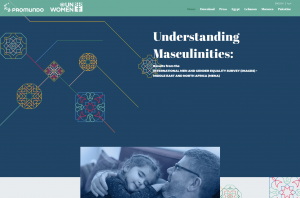Four news from the research front line…
1
The International men and gender equality survey (IMAGES) has recently been made in four Arabic countries (Egypt, Lebanon, Morocco, Palestine). The IMAGES survey model, developed from 2009 onwards, is partly based on the Norwegian model in the 2007 (Likestilling og livskvalitet – Gender Equality and Quality of Life) survey, adapted to international use especially in the south world, now further developed in an Arabic version. The Economist writes about the study:
The study can be found here:
2
IMAGES has developed the original Norwegian model internationally. At the same time, it has been developed in a European context.
 The first results from a Polish-Norwegian project (Gender equality and quality of life) are now published. A representative survey was made in Poland 2015, combined with qualitative research. The aim was not just to address the most pressing issues of men and masculinities (like IMAGES), but to improve the general mapping of gender in/equality in society and culture. The model was adapted to the more “gender conservative” (in some ways) context of Poland. Two books will be published from the project. Now, the “European blueprint” and “guide” have been published. This is a proposal for a European-wide follow-up study, based on the Poland/Norway testing.
The first results from a Polish-Norwegian project (Gender equality and quality of life) are now published. A representative survey was made in Poland 2015, combined with qualitative research. The aim was not just to address the most pressing issues of men and masculinities (like IMAGES), but to improve the general mapping of gender in/equality in society and culture. The model was adapted to the more “gender conservative” (in some ways) context of Poland. Two books will be published from the project. Now, the “European blueprint” and “guide” have been published. This is a proposal for a European-wide follow-up study, based on the Poland/Norway testing.
http://www.geq.socjologia.uj.edu.pl/en_GB/blueprint
The first book has just been published, describing the the project and the new research developments.

https://www.peterlang.com/view/product/25785?tab=toc&format=HC
The second book, with detailed Poland results, will be published soon.
3
Other research fields and groups are starting to pick up the results, and develop the gender equality and masculinities dimensions in their own ways. This includes an international experimental psychology study:
Krys, Kuba, Capaldi, Colin, et al 2017: Catching up with wonderful women: The women-are-wonderful effect is smaller in more gender egalitarian societies. International Journal of Psychology, 2017. DOI: 10.1002/ijop.12420
The results indicate that the perception of men is more positive in relatively gender-equal countries. In a related experimental study, the researchers find that threat and vulnerability (male role pressure) lowers men’s support for gender equality:
Natasza Kosakowska-Berezecka, Tomasz Besta, Krystyna Adamska, Michal Ja´ skiewicz, Pawel Jurek, Joseph A. Vandello 2016: If My Masculinity is Threatened I Won’t Support Gender Equality? The Role of Agentic Self-Stereotyping in Restoration of Manhood and Perception of Gender Relations. Psychology of Men & Masculinity, 17, 3, 274 –284
In another new study, in the US, researchers investigated the role of the “zero sum perspective” on gender equality – the idea that men will lose what women gain, in terms of gender equality. The results show that social dominance and sexism factors are linked to the zero sum perspective, and that men endorse this perspective more than women. Cf Joelle C. Ruthig, Andre Kehn, Bradlee W. Gamblin, Karen Vanderzanden, Kelly Jones 2017:
When Women’s Gains Equal Men’s Losses: Predicting a Zero-Sum Perspective of Gender Status. Sex Roles 76, 17-26
4
The internationally renowned masculinities researcher James Messerschmidt gave a presentation of “revised” hegemonic masculinity theory, at a well-visited seminar arranged by the Centre for Gender Research, University of Oslo, May 3, titled
Going into the theory development in depth, Messerschmidt described how it has led to a more nuanced, open view, which is complex, but also more precise than the sometimes “vulgarized” versions of the theory. This was followed by critical and constructive debate, with students as well as senior researchers participating. A summary and comment on the seminar, by professor Hanne Haavind, has been published at the center’s web site:
http://www.stk.uio.no/forskning/aktuelt/aktuelle-saker/2017/gjensyn-med-hegemonisk-maskulinitet.html


